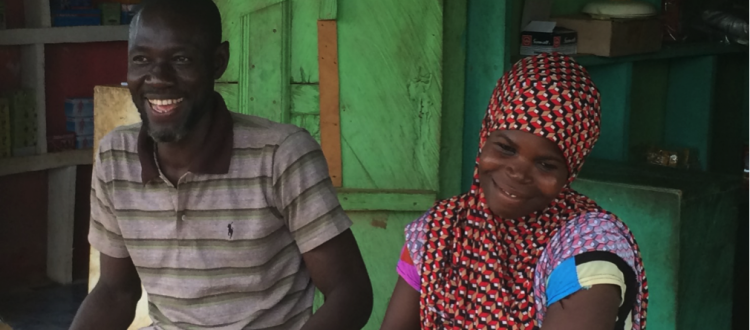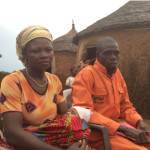Touching the Finishing Line
MAZA has had a fantastic journey over the last three years, so it is with mixed feelings that we announce that we will be winding down our operations by the end of 2018. This development has come about in spite of the positive results we have had in improving access to urgent health care transportation and increasing access to markets for farmers and traders in Chereponi and Bunkpurugu-Yunyoo districts in Northern Region, Ghana.
In just three short years, MAZA drivers have transported more than 600 people in need of urgent or emergency health care transportation in these two districts, the overwhelming majority of whom have been MAZA’s target population of pregnant women and sick infants. An independent evaluation of our work in Bunkpurugu-Yunyoo revealed that deliveries conducted by skilled health workers have doubled from 49% during the baseline period to 96% at the endline period in March 2018. Also, 96% of the farmers interviewed reported having post-harvest losses of less than 10% in the endline compared to 35% in the baseline period and they attributed this to access to motorized tricycles, including MAZA’s. For more details, visit our previous blog.

These encouraging results notwithstanding, we have experienced substantial challenges to sustainability and growth because of the following key reasons:
- Financial sustainability
Our lease-to-own model for the MAZA tricycles is a key factor of our social enterprise sustainability model. Yet, the loan repayment rate by MAZA drivers has been poor and unreliable despite our best efforts to learn from early results, adapt the model and enforce the consequences of defaulting. In parallel, raising sufficient grant funds to fill the gap has been challenging this year. Moreover, we are reluctant to rely solely on donor funding as that can fluctuate quite significantly.
We have also learnt about the recent rapid increase in the density of motorbikes and motorized tricycles for both private and commercial use in the rural areas of Ghana. This has increased access to transportation, including that for urgent health care, commercial passengers, and hauling produce from farms to household and may also explain why MAZA drivers’ incomes have reduced and why their loan default rates have worsened in 2018. An assessment by our intern from the University of North Carolina’s Gillings School of Global Public Health a few months ago revealed that most of the pregnant women living more than a kilometer away from a MAZA driver preferred to access their husband’s or neighbour’s motorbike when labour started rather than call a MAZA driver; this provided additional support to our observations about the improved transportation options in remote rural areas.
- Systemic challenges that stifle progress
Even as MAZA drivers have defied the odds to transport pregnant women and sick infants to health care facilities at all times of the day and night, on rocky paths and through waterlogged roads, the systemic challenges persist and sometimes worsen. Most immediate of these is the National Ambulance System which has decreased its coverage of functional ambulances in the past few years.
A news article published on Citi News Room in May 2018 revealed that only one-third of the ambulances in the national fleet were functional. We were astounded to learn that there were only six functioning ambulances in the whole of Northern Region, which has a land mass of more than 70,000 km2 and about 3.5 million inhabitants. Not surprisingly, midwives in the districts where we work are increasingly relying on MAZA drivers to transport emergency cases in need of hospital care (e.g. emergency Caesarian section due to obstructed labour or blood transfusion following bleeding after birth) from their health centres to hospitals. Transportation for such referrals is the job of paramedics in a functioning ambulance rather than MAZA drivers who are lay people with limited first aid skills driving a motorized tricycle with the patient and a family member in the back without medical support.
Other major systemic challenges that MAZA and the communities we serve face include:
- Poor quality roads that become waterlogged and impassable during the rainy season; these same roads also dramatically increase the wear and tear on our tricycles and related maintenance costs.
- Limited telecommunications coverage, which sometimes makes phone communication with our drivers and passengers impossible.

As MAZA winds down, we are heartened by the improved transportation options available to remote rural communities in Northern Region. However, since MAZA’s service has been free of charge for pregnant women and sick infants, financial access may not be assured for these vulnerable groups in the future.
Moving Forward
We plan to use our remaining funds in two distinct ways that are directly related to our work:
- Support Ghana Health Service in the two districts in which we have worked in their efforts to facilitate the Community Emergency Transportation System. This system encourages communities to develop an internally-generated pooled financing mechanism to pay for emergency health transportation for their members. This is a promising approach now that the density of motorbikes and motorized tricycles is increasing in remote rural areas.
- Advocate to government authorities and other duty bearers to address the systemic challenges facing people living in remote rural areas when accessing urgent/emergency health care, especially improved functionality of the national ambulance fleet and improvement in the road infrastructure. We will do this through resource support to key media houses in Ghana with an activist bent to cover more news stories from remote rural areas of the country about these systemic challenges and the progress being made to address them.
We strongly believe we can have a greater and more lasting impact at those two levels than at the level we have been working at for the past three years.
We are incredibly grateful to all of MAZA’s donors and supporters who have been with us on this amazing journey. Thanks to your generosity, we have increased the timeliness with which more than 600 people in need of urgent health care in remote rural areas gained access to it and in so doing, reduced their risk of worsened illness, disability or death. Together, we have also provided income-generating opportunities for MAZA drivers and improved the livelihoods of traders and famers in our two districts through increased access to affordable transportation locally.
We will be sure to keep you updated on our progress with the new direction of work we described above.
Thank you once again!
The MAZA Team
Awuni, Berthylin, Genevieve, James, Jamila, Nana & Nash



